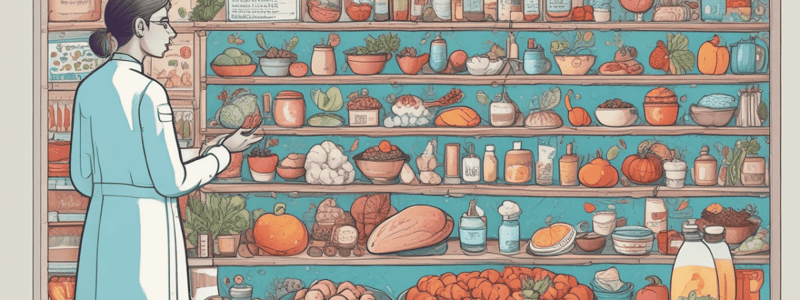Podcast
Questions and Answers
Which of the following bacteria can be found in soil and intestines of animals and humans?
Which of the following bacteria can be found in soil and intestines of animals and humans?
- Clostridium Botulinum (correct)
- Bacillus Cereus
- Campylobacter Jejuni
- Salmonella
What is the incubation period for Staphylococcus Aureus?
What is the incubation period for Staphylococcus Aureus?
- 8-24 hours
- 1-6 hours (correct)
- 12-36 hours
- 2-7 days
Which bacteria is typically carried by humans and can infect raw milk?
Which bacteria is typically carried by humans and can infect raw milk?
- Staphylococcus Aureus (correct)
- Campylobacter Jejuni
- E.Coli
- Salmonella
What is the main source of Clostridium Perfringens?
What is the main source of Clostridium Perfringens?
Which of the following control measures is NOT applicable to Salmonella?
Which of the following control measures is NOT applicable to Salmonella?
What is the incubation period for Clostridium Botulinum?
What is the incubation period for Clostridium Botulinum?
Which bacteria is transmitted through raw milk, untreated water, and cross-contamination with poultry?
Which bacteria is transmitted through raw milk, untreated water, and cross-contamination with poultry?
What is the main source of E.Coli?
What is the main source of E.Coli?
Which bacteria can contaminate cereals, spices, dairy products, and starchy foods?
Which bacteria can contaminate cereals, spices, dairy products, and starchy foods?
What is the incubation period for Campylobacter Jejuni?
What is the incubation period for Campylobacter Jejuni?
Flashcards are hidden until you start studying
Study Notes
Salmonella
- Found in human and animal intestines, present throughout the food chain
- Incubation period: 12-36 hours
- Control measures: proper cooking, temperature control, hygiene practices, avoiding cross-contamination, pest control, staff training, and using quality-assured eggs
Staphylococcus Aureus
- Carried by humans (nose, hair, mouth, etc.) and infects raw milk or processed foods handled by many people
- Incubation period: 1-6 hours
- Control measures: temperature control, good personal hygiene, excluding infected individuals from food handling, using pasteurized milk, and staff training
Clostridium Perfringens
- Originates from human intestines, spread by insects and flies to raw meat and cooked dishes like stews
- Incubation period: 8-24 hours
- Control measures: cooking in small batches, washing vegetables thoroughly, maintaining strict hygiene and temperature control, staff training, and designated food zones
Clostridium Botulinum
- Found in soil and intestines of animals/humans, can grow in canned foods under improper conditions
- Incubation period: 12 hours to several days
- Control measures: proper heat treatment of canned foods, strict controls on fish smoking and handling, discarding defective cans, maintaining acidic environments, and staff training
Bacillus Cereus
- Originates from soil and dust, contaminates cereals, spices, dairy products, and starchy foods
- Incubation period: 0-24 hours
- Control measures: thorough cooking, proper temperature control, reheating only once, and staff training
E.Coli
- Found in human and animal intestines, present in raw meat (especially minced), untreated water, and unpasteurized milk
- Incubation period: 12-72 hours
- Control measures: personal hygiene, milk pasteurization, proper cooking of meat, and staff training
Campylobacter Jejuni
- Originates from animal intestines, transmitted through raw milk, untreated water, cross-contamination with poultry, and can cause relapses
- Incubation period: 2-7 days
- Control measures: milk pasteurization, thorough cooking, washing vegetables, proper reheating, strict temperature control, staff training, and designated food zones
Listeria
- Found in contaminated utensils, soil, dust, raw milk products, vegetables, and some cheeses
- Incubation period: 1-72 days (long incubation period)
- Control measures: milk pasteurization, thorough cooking, meticulous vegetable washing, proper reheating, strict temperature control, staff training, and designated food zones
Studying That Suits You
Use AI to generate personalized quizzes and flashcards to suit your learning preferences.




